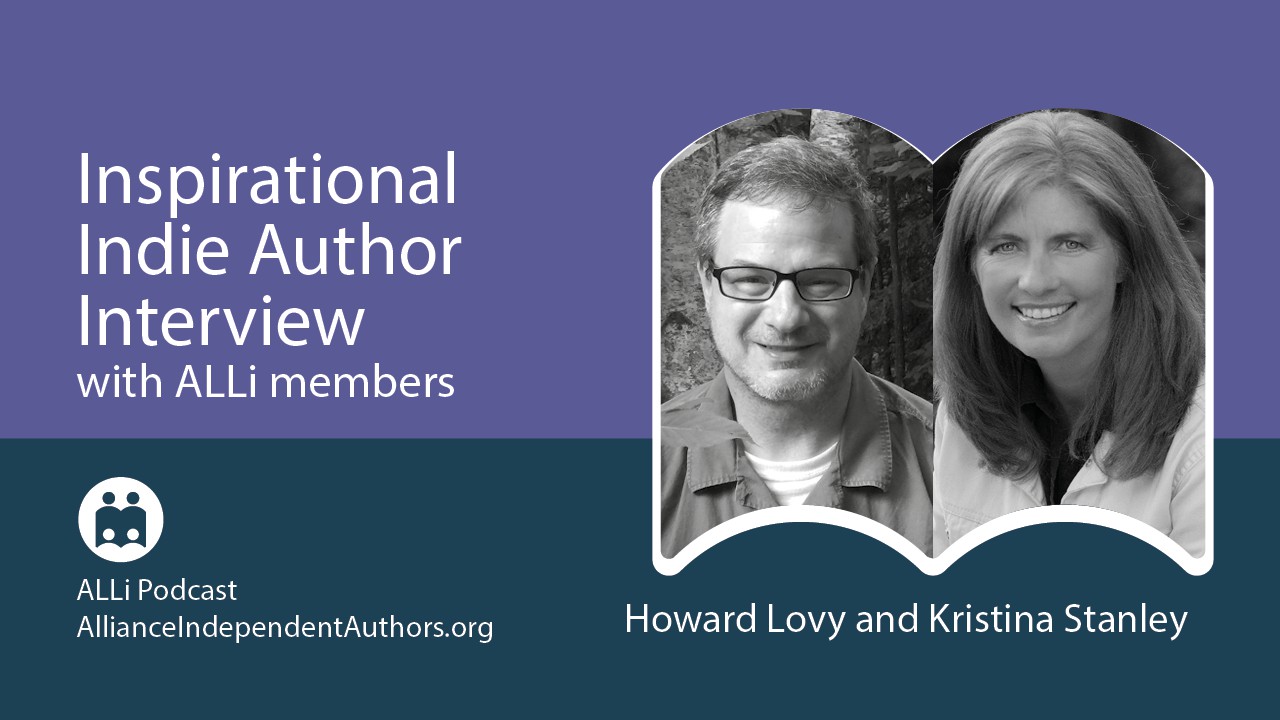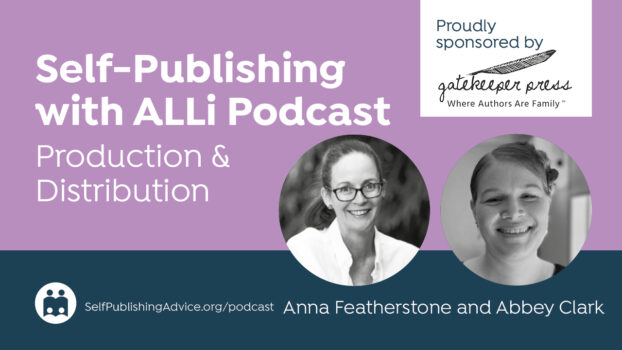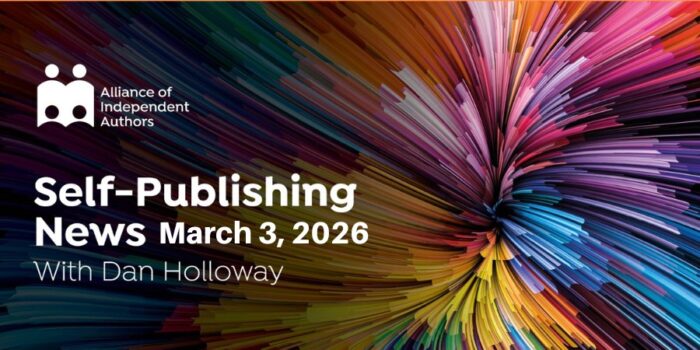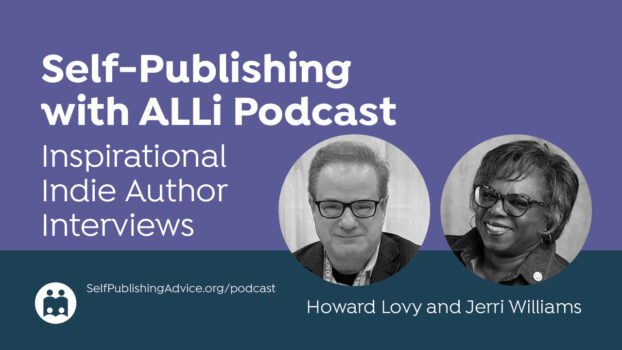My guest this week is Kristina Stanley, a rare writer who also loves math. You don't find too many who can use both the logical and artistic sides of their brains. The way Kristina has combined the two talents is in the fiction-writing software she developed that guides writers along the way to achieving their artistic vision. But, first, let's learn more about Kristina's mathematical mind.
Every week I interview a member of ALLi to talk about their writing and what inspires them, and why they are inspiring to other authors.
A couple of highlights from our interview:
On Writing a Scene
So, in the morning, I have nothing, and at the end of the day I have a new scene and that makes me really happy, and I can feel it in my brain. It's like a light has come on.
On Her Fictionary Product
It's more of a guide to help a writer make sure they know all the different ways of telling a good story and what works and what doesn't. And why is it not working, for example.
Listen to My Interview with Kristina Stanley
Subscribe to our Ask ALLi podcast on iTunes, Stitcher, Player.FM, Overcast, Pocket Casts, or Spotify.
On Inspirational Indie Authors, @howard_lovy features @StanleyKMS, a rare writer who also loves math. She combined the two talents in fiction-writing software. #WritingAdvice Share on XFind more author advice, tips and tools at our Self-publishing Author Advice Center: https://selfpublishingadvice.org, with a huge archive of nearly 2,000 blog posts, and a handy search box to find key info on the topic you need.
And, if you haven’t already, we invite you to join our organization and become a self-publishing ally. You can do that at http://allianceindependentauthors.org.
About the Host
Howard Lovy has been a journalist for more than 30 years, and has spent the last six years amplifying the voices of independent publishers and authors. He works with authors as a book editor to prepare their work to be published. Howard is also a freelance writer specializing in Jewish issues whose work appears regularly in Publishers Weekly, the Jewish Daily Forward, and Longreads. Find Howard at howardlovy.com, LinkedIn and Twitter.
Read the Transcript of My Interview With Kristina Stanley
Howard Lovy: I'm Howard Lovy and you're listening to Inspirational Indie Authors.
Every week, I feature a member of the Alliance of Independent Authors to find out what inspires them and how they are an inspiration to other authors.
My guest this week is Kristina Stanley, who is a rare writer who also loves math. You don't find too many who can use both the logical and artistic sides of their brains. The way Kristina has combined the two talents is in the fiction-writing software she developed that guides writers along the way to achieving their artistic vision.
But first, let's learn more about Kristina's mathematical mind.
Kristina Stanley: Well, hello, I'm Kristina Stanley. I am a mystery author. I am a story editor. I run a company called Fictionary, which is online software for editors and writers to help them perform a story editor, and I’ve been working at that and writing for a good 15 years now.
I have grown up all over the world. I've lived in Canada, and the US, and Sweden. In Japan, in Germany, in Aruba, Bahamas. So, I travel a lot and live in many places. Mostly, I grew up in Ottawa, Kingston, Ontario area with a couple of years when I was quite young in Sweden. And then, you know, by the time I finished high school, I'd been to 11 different schools. So, we moved a lot. My father was a professor of engineering and he had a philosophy that to be really good at teaching, you also needed to work in the industry. And so, he worked in the industry and at universities throughout his career. And so, of course, our family followed him around.
Howard Lovy: Kristina went to university in Ottawa, Canada doing a year of business school, but she discovered that business was not for her. Along the way, she discovered that she really liked computer science and math. So, she combined them into a degree in computer mathematics or the numbers and formulas behind computer programming.
And it's in those numbers that Kristina really found herself.
Kristina Stanley: It's mind candy for me, it's puzzles. It's, you know, on the other end of the spectrum from writing a story, in a way, in that there's very specific rules and you need to follow them. And I liked the patterns of it, which is what drove me to liking the patterns of a story. Although more fluid, there's still patterns and structures, and that's what I'm very interested in, in story.
On the math side, it's like, you know how people love to do crossword puzzles and that kind of thing? That's what math is for me. It's just entertaining my brain at something that is just, I don't know, how do you explain why you're interested in something, but it's entertaining for me.
Howard Lovy: But before Kristina discovered the writer in her, she put her computer mathematics skills to use.
Kristina Stanley: So, I worked for a company called Bell Northern Research in Ottawa, which doesn't exist anymore, but Nortel Networks was the owning company, and with that, I was able to, not only work in Ottawa, but I worked for three years in Tokyo, Japan, and I worked for four years in Friedrichshafen in Germany.
So, I did about 12 years there. My husband also worked there and worked internationally with me, and so that was our first 12 years of marriage, basically.
Howard Lovy: Eventually, Kristina discovered, almost by accident, her love of reading and her desire to be a writer.
Kristina Stanley: It came out of left field, and it actually happened when I was in Germany. I read a book by Mary Higgins Clark called Moonlight Becomes You, and it's a murder mystery, closer to the cozy side of murder mysteries. But I read it at night before I had a business trip, and I had to get to Zurich in the morning. So, I had a car picking me up at 4 a.m., and I was reading this book and I knew I should go to bed and I couldn't, I just kept reading this book and reading this book and so, of course, by the time the car came, I was exhausted and knew I should have slept, but I didn't, I read this book. And in the car on the way I thought, I want to write something that does that to someone else, where you just kind of forget your entire life and everything you're supposed to be doing and read this story. And I loved it, and once in a while I go back and read it to go, what the heck was it that? But it was my first inkling, although I didn't do anything about it for a long time, it was sort of setting the stage of what I wanted to do.
Howard Lovy: And here's where the other half of her career began. She sat down to write a book, but the mathematician in her could not help but turn her books into puzzles, into mysteries.
Kristina Stanley: Writing came next. And there, I was living in a ski resort in Western Canada and thought, you know, I'm going to write a book and that's as much as I knew about writing a book, I'm just going to write one. So, I started with a woman on a bus moving to a ski resort, because that's where I was living. I had no idea really.
I knew I wanted to write a mystery because that's what I love to read, and so, I just started writing. And I wrote for a couple of years, you know, for fun and I really enjoyed it, and then I took a course at Humber School for Writers in Toronto, and I had a Canadian author, Joan Barfoot as my mentor.
And that's when I started to really get serious about writing, and she was a great editor, super positive, but also very informative and I've learned a ton from her, including how to use a comma, which was a surprise to me that I didn't know how to use a comma, but really I didn't. So, I went through that process and really loved it. And then, I wrote three mysteries, basically, that take place in a ski resort because it's where I was living and loved it there.
There's a puzzle, right? And so, you've got to figure out what's the puzzle? I don't actually think about what the author's doing, I think about the story and I love the whodunit kind of thing where there's a murder and then the whole story is about, well, who did it and why did they do it? And so, I love that. I love thinking about that and trying to figure it out and, for me, I just find it very interesting.
What does happen to me when I've written a scene? So, in the morning, I have nothing, and at the end of the day I have a new scene and that makes me really happy, and I can feel it in my brain. It's like a light has come on. You just feel good that, you know, whether the scenes any good or not, it's not relevant, it’s that I created something that didn't exist before. And it's part of something bigger, which I don't know what that is yet, and that's the exciting part for me.
Howard Lovy: It wasn't long before Kristina's work captured the attention of a publisher.
Kristina Stanley: So, there, I just got a little bit lucky in that I submitted my first novel to Crime Writers of Canada for their Unhanged Arthur award and got shortlisted, and at the same time, I submitted my second novel to the Crime Writers Association for the Debut Dagger in the UK, and was shortlisted.
And so, within a three-week period, I had two shortlists, then I was able to get a publisher. And in a way, I got a little bit lucky, my agent retired about a month before and so, I transitioned over to a publisher without an agent. So, that was quite nice from a financial point of view. So, I was lucky in that respect, and then I did four books with that publisher: fiction and one nonfiction with them.
Howard Lovy: Now Kristina was a writer, but she is the rare writer who is also good at math. So, she soon developed some formulas for herself on basic rules for writing fiction and, like any organized, scientific mind, she put them in an Excel spreadsheet. From there, the idea of fiction-writing software was born.
Kristina Stanley: That was actually my husband's idea.
We were on a sailboat in The Bahamas, and I was working away, and he walked by my computer and said, what are you doing? And I said, oh, I'm writing. And he went, in Excel? Why are you in Excel? I'm like, uh.
So, what had happened, my agent at the time, very wisely, I think, suggested that my third book in the series should really be the first book.
And I was in the process of rewriting everything to take book three and make it book one, book one to book two, and book two to book three. And so, I had this very elaborate spreadsheet, which I'd spent years writing tips in, so that I had this huge spreadsheet of, okay, what do you need to look at for every scene per character? And what do you need to the look at for plot and for settings? And so, I had this crazy busy spreadsheet all linked up and my husband looked at that and went, oh, there's got to be a product for that, I'll find you something better. You can't just use Excel. And so, of course, he went and looked and went, Oh, there's nothing. Because there's really nothing out there that focuses on the structure of a story. There's a ton of great grammar software, you know, Pro Writing Aid is one of them, where you can do all of your copy editing, but there's nothing for story editing. And by story editing, I mean, structural or developmental or substantive, but I don't like those terms because I never understood what they meant.
Where a story edit is about editing your story, not your words, and so I liked the term story edit. And so, we kind of talked about it then and thought, you know, we could do this, why don't we build something? And what we tried to build is something that would guide a writer, but not be too strict. So, here are all the things you should look at in a scene, but use them as you choose because you are the artist and you're the creative person, but don't forget to think about these things. And so, we wanted to put something where a writer could easily get a ton of writing information without having to search through books and the internet, like I was doing and sticking it in a spreadsheet.
We put all that in there along with 38 story elements that we felt were key, although I had 86 in my spreadsheet, but that was just too overwhelming for people. So, we kind of (inaudible) at 38.
So, we wanted something that writers could, you know, every time they write a book, get better at it, instead of trying to write it and stare at their draft and go, I don't know what to do with this.
Howard Lovy: What Kristina eventually came up with, was a product she called Fictionary.
Kristina Stanley: What happens is a writer imports their manuscript and Fictionary organizes it into chapters and scenes. And then from that it uses natural language processing to analyze the scenes and it draws a story arc of what the actual story arc is for that story, and what the recommended story arc is for commercially successful fiction.
And I say recommended, because again, there are no rules, but there are guidelines, and if you don't follow them as a writer, you should at least know why you're not following them and make a decision not to, as opposed to just not doing it because you don't know better. So, it does that, and it pulls out all the characters and it links them to scenes and it shows a writer how many characters are in each scene, how many scenes each character has, who's got the point of view, how many times they have the point of view, what percentage of the book, and it grafts out the word count per scene so you can look at your pacing. And so, there's a whole bunch of visuals for the writer to look at before they start revising.
And then for each scene, we've got the elements laid out. Some of them are filled out automatically and some of them the writer fills out. What's the point of your characters goal, is something a writer would fill out and, if they don't know, well, then what's the point of the scene? So, there needs to be a goal for every scene for the point of view character.
And if they don't understand it, then they can click a little question mark, and there's the writing tips behind it to go, oh, okay, that's what it is. And then they can go ahead and look at their scene and decide, does the point of view character have a goal or not? And is it related to the plot or not?
It helps the writer as they're revising, and then every time they make changes, the visual insights updates, so they can see, oh, okay, that's better, or I still have too many point of view characters, and that kind of thing.
Howard Lovy: If this sounds like some kind of computerized formula to writing books, Kristina says, all you have to do is use it once, and you'll discover that it's not. It helps, not hurts the artistic process.
Kristina Stanley: If people make comments about, it's a formula, once they try the software, they go, oh, it's not a formula. It's really guidelines in that, it's like anything you do, if you learn the craft behind the art, then you can be artistic. But if you don't know your basic craft, then how can you be artistic? It's very difficult. And so, once people actually use it, they get that it's not, it's more of a guide to help a writer make sure they know all the different ways of telling a good story and what works and what doesn't. And why is it not working, for example. And so, say someone's writing a thriller and they enter every scene with a big paragraph of description. Well, that's not really a thriller, right? It's going to be a little bit boring. People reading a thriller want some action and there should be more scenes starting with action and it shows those things. And then the writer can decide, well, but I need this description for certain reasons, so, okay, that's fine. Or, oh, I could start the scene two paragraphs down, its way better. And so, the writer makes the choice, it's not the software saying you have to do this. It's hopefully opening your eyes as a writer to go, oh, look, I start, you know, 27 out of 30 scenes in description and I'm writing a thriller.
Howard Lovy: Kristina is also an editor and she uses a version of her software called Story Coach when she edits books.
Kristina has identified some of the biggest manuscript problems her software discovers.
Kristina Stanley: The biggest thing we see is, with newer writers, not knowing how to break their story into scenes, which is critical for flow and reading enjoyment from the reader's perspective.
So, that's kind of the number one thing that people get is, how to start and end a scene, how to flow from one scene to the next, how long a scene should be, where it should be in their novel. And so, a lot of it is about learning, what is a scene, and how to start and end it. That's the most common thing we see.
And then the next thing behind it is people with too many point-of-view characters in their story, and not really knowing whose story it is. That comes out really quickly in the software that there isn't a clear protagonist in the story based on the number of point of views and the order and the balance of how they come into the story.
Howard Lovy: Whether you use software or not, Kristina is a big proponent of self-editing before handing your manuscript off to a professional editor. It's good to distance yourself and put yourself in editing mode. That will make you a little more receptive to a professional editor’s advice.
Kristina Stanley: I'll tell you, I believe very strongly that writers should all self-edit, and I don't mean copy-edit or proofread because you can't see ‘if' and ‘of' and, you know, little words ‘the' and ‘that', your eye can't see them anymore. But I really believe that a writer should story edit, in that they need to do the best shot at their story before having an editor look at it, and I believe it for two reasons. One, it teaches you how to write. And two, it gives you a little bit more strength in dealing with an editor. Working with an editor can be very intimidating, but if you've already edited and you know what a story edit is, and then you work with an editor, you can understand why the editor's giving you specific advice and you can also push back a little bit and go, no, I did this for a specific reason and it's this, I'm not changing it.
Not that a writer ever has to change what an editor suggests but I find that, the writers who have done some self-editing, work much better with an editor and are way more open to trying different things and changing the story a bit, without becoming too personal; that is my story and I don't want to change it.
It enables the writer to work better with an editor, and it enables the editor to give higher quality advice if the story is higher quality. So, the writer gets more for their money than if they send it too soon and haven't thought through their story on their own.
Howard Lovy: No matter what method of writing and editing you use, the bottom line, Kristina says, is to pick a topic you're passionate about and just begin writing, make it enjoyable for yourself and readers will follow.
Kristina Stanley: Pick something, a topic you love, because you've got to spend a lot of time with the book. And I know there's the thing of, write what you know, but you can always research what you don't know.
You know, I wrote a ski murder mystery, because I love being on the mountain and skiing. And so, I could write a whole thing around that, and I wrote a murder mystery because I love reading them, a certain type, and so that's what I wrote. So, I think when you start out, you have to write something that you're passionate about, pick that topic and make a story around it, because then it's super fun even when you're doing your research and all of that, it makes it way more fun for you. And it's a long haul, so it needs to be something that you love doing.





